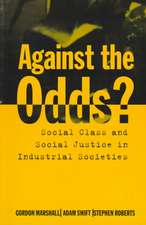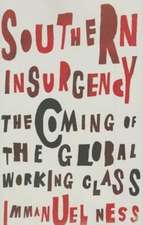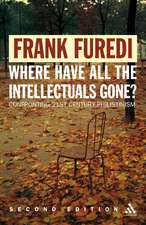When Did We All Become Middle Class?
Autor Martin Nunleeen Limba Engleză Paperback – 12 aug 2016
Written in a conversational style, this book is a useful tool for undergraduate courses covering social class, such as inequality, stratification, poverty, and social problems.
| Toate formatele și edițiile | Preț | Express |
|---|---|---|
| Paperback (1) | 409.48 lei 6-8 săpt. | |
| Taylor & Francis – 12 aug 2016 | 409.48 lei 6-8 săpt. | |
| Hardback (1) | 1217.29 lei 6-8 săpt. | |
| Taylor & Francis – 16 aug 2016 | 1217.29 lei 6-8 săpt. |
Preț: 409.48 lei
Nou
Puncte Express: 614
Preț estimativ în valută:
78.38€ • 85.17$ • 65.88£
78.38€ • 85.17$ • 65.88£
Carte tipărită la comandă
Livrare economică 21 aprilie-05 mai
Preluare comenzi: 021 569.72.76
Specificații
ISBN-13: 9781138655256
ISBN-10: 1138655252
Pagini: 216
Ilustrații: 28
Dimensiuni: 152 x 229 x 23 mm
Greutate: 0.29 kg
Ediția:1
Editura: Taylor & Francis
Colecția Routledge
Locul publicării:Oxford, United Kingdom
ISBN-10: 1138655252
Pagini: 216
Ilustrații: 28
Dimensiuni: 152 x 229 x 23 mm
Greutate: 0.29 kg
Ediția:1
Editura: Taylor & Francis
Colecția Routledge
Locul publicării:Oxford, United Kingdom
Cuprins
1. Class Confusion
2. What Social Class Isn’t
3. Defining Classes
4. The Basis of Class
5. Social Class and Political Power
6. Social Class and Race
7. Gender and Social Class
8. Media Marketing and Social Class
9. Conclusion
2. What Social Class Isn’t
3. Defining Classes
4. The Basis of Class
5. Social Class and Political Power
6. Social Class and Race
7. Gender and Social Class
8. Media Marketing and Social Class
9. Conclusion
Notă biografică
Martin Nunlee, PhD., is an associate professor of marketing at Delaware State University, a small mid-Atlantic HBCU (Historically Black College and University). Although his area of expertise is in marketing channels, distribution, and strategy he has published papers in such diverse topics as advertising, promotions, and legal ethics, along with delivering papers on a variety of social issues.
Descriere
In When Did We All Become Middle Class?, Martin Nunlee discusses how a lack of class identity gives people a false sense of their relationship to power, which has made the US population accept the myth that they live in a meritocracy. This book examines social class within the framework of psychological tendencies, everyday interactions, institutions and pervasive cultural ideas to show how Americans have shifted from general concerns of social and economic equality to fragmented interests groups.















